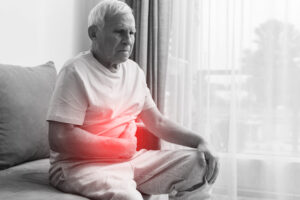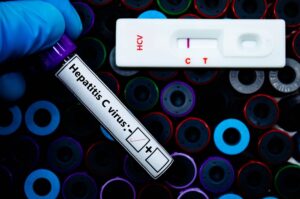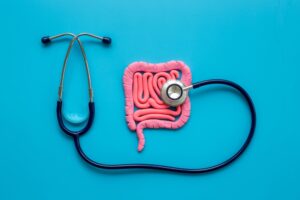
Signs of Stomach Ulcers
Stomach ulcers are open sores that develop on the lining of the stomach or small intestine, but heartburn is caused when stomach acid flows back into the esophagus.

Do you know the tickling feeling of having butterflies in your stomach? Have you ever felt that you were unable to make a difficult decision without feeling pain or discomfort in your stomach? This may be an indication of issues with your gut, and it might be because you have an excessive amount of stress in your life. Today, we will take a look at stress & exercise’s role in gut function.
There is growing evidence that there is a direct connection between your brain and your gut. Harvard Health explains the connection between the two very well by saying:
The brain has a direct effect on the stomach and intestines. For example, the very thought of eating can release the stomach’s juices before food gets there. This connection goes both ways. A troubled intestine can send signals to the brain, just as a troubled brain can send signals to the gut. Therefore, a person’s stomach or intestinal distress can be the cause or the product of anxiety, stress, or depression.
The connection between those essential parts of the body can cause someone who carries an excessive load of stress to notice significant digestive health issues.
Speaking with Everyday Health, Kenneth Koch, MD, professor of medicine in gastroenterology at Wake Forest University Baptist Medical Center, stated that stress can impact every part of one’s digestive system. He wasn’t joking when he stated this. The digestive health issues might you face if you are dealing with excessive stress loads include the following:
As you can see, stress can manifest in several ways that are destructive to your digestive health. This provides you with every reason in the world to try to shed some of the stress from your day.
Getting yourself out to exercise is certainly not the easiest thing to do. However, you will find that exercise plays a pivotal role in your digestive health. If you don’t exercise for any other reason, you should at least consider doing so to help improve the quality of your digestive health. AXA Health reports that exercise improves the blood flow throughout your body and improves your digestive health on the whole. They also note that scientific research indicates that regular exercise helps to regulate the bacteria in your stomach and gut. This can make it easier to avoid the worst digestive issues you might otherwise face.
Stress & exercise’s role in gut function are two things that we should not brush aside so quickly. There are many impacts that both of these elements have on all of our lives. The connections show up not only in one’s subjective experience but also in the scientific research that exists on these topics.
You don’t want to leave yourself in a situation where stress runs amok in your life and your digestive health becomes a victim of the out-of-control stress that has taken over. There are several techniques that one can use to help reduce and control the amount of stress they have in their lives. A few of these techniques include:
Managing your stress levels will improve your quality of life in a significant number of ways, including the fact that you can improve your digestive health. Take time out of your day to ensure that your stress levels are managed.
Changing your diet to include more fruits and vegetables is a quick way to see improvements in your digestive health. It is a sad fact that most of us are not getting enough of these healthy foods in our diet regularly. However, any of us can make some changes now to start including the kind of things that will bring balance to your diet.
John Hopkins Medicine states the following about the changes you can and should make to your diet:
Making better food choices involves eating a balanced diet that is rich in fruits and vegetables. These foods provide the fiber needed to build good bacteria and guard gut health. In general, choosing whole foods over processed foods will promote healthy digestion. Processed foods often contain added sugar, fat, and salt. In addition, processed foods may have lost many of their original nutrients during the food manufacturing process.
This means you can make choices to improve your gut health every time you go to the grocery store. Improve your diet and you will notice improvements to your gut health in no time.
Not every gut health issue can be addressed with a simple change to your diet. If your digestive health situation continues to worsen, you should reach out to a doctor right away. You should also reach out to a doctor if you believe that any of your symptoms could lead to worse health outcomes for you moving forward.
It is so important to take care of your digestive health, and the best way to begin to do so is to ensure that you bring your stress levels down right away. Take measures to make it happen now.

Stomach ulcers are open sores that develop on the lining of the stomach or small intestine, but heartburn is caused when stomach acid flows back into the esophagus.

Poorly absorbed carbs may ferment in the gut, leading to symptoms such as bloating, gas, diarrhea, or constipation.

If left untreated, GERD can lead to complications including esophagitis (inflammation of the esophagus), strictures (narrowing of the esophagus), or even Barrett’s esophagus, a condition that increases the risk of esophageal cancer.

IBS-C often requires a tailored approach that incorporates dietary changes, stress management, and sometimes prescribed medications to regulate bowel movements and reduce discomfort.

Hepatitis C can affect women differently due to hormonal variations, immune system responses, and unique physiological factors

This connection means that stress, anxiety, and other psychological factors can directly impact gut function, leading to symptoms like abdominal pain, bloating, and irregular bowel movements.

Chronic inflammation associated with IBD can lead to complications such as joint pain, skin conditions, eye issues, and more.

How different types of fiber affect IBS is crucial to creating a diet that supports digestive health without triggering flare-ups.

Lactose Intolerance occurs due to a deficiency of lactase, the enzyme responsible for digesting lactose in the small intestine.

This condition can result from various factors, including poor diet, stress, infections, or underlying health conditions like IBD.

One of the most essential steps in managing IBS is identifying specific triggers and paying attention to your body’s unique responses.

Although the symptoms of IBS can vary widely from person to person, several common signs are associated with the condition.
For Your Visit
Brick Office
P: 732-458-8300
Brick Medical Arts Building
1640 Route 88, Suite 202
Brick, New Jersey 08724
Mon – Fri: 8:30AM – 5:00PM
Sat & Sun: Closed
Neptune Office
P: 732-776-9300
Jersey Shore Medical Arts Building
1944 Corlies Ave. Suite 205
Neptune, New Jersey 07753
Mon – Fri: 8:30AM – 5:00PM
Sat & Sun: Closed
Jackson Office
P: 732-928-2300
706 Bennetts Mills Road
Jackson, New Jersey 08527
Mon – Fri: 8:30AM – 5:00PM
Sat & Sun: Closed
© All Rights Reserved